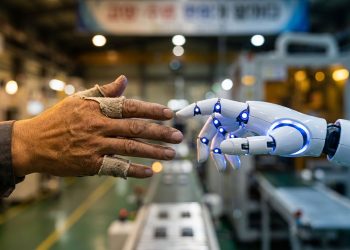The South Korean government has announced a budget allocation of $70 million to enhance education digital infrastructure within schools. This initiative aims to support the integration of Artificial Intelligence (AI) digital textbooks, which are set to be fully implemented next year. The investment will facilitate the construction of digital device laboratories, improve network reliability, and establish an integrated control system for learning data hubs.
This government financial injection aims to advance education through AI-powered teaching and learning methods. By focusing on digital infrastructure improvements, South Korea seeks to create an environment conducive to the effective utilization of AI technologies in public education. This will eventually enhance the quality and accessibility of learning experiences for students across the country.
The government’s initiative targets third—and fourth-grade students at elementary schools and first-grade students at middle and high schools, with the aim of easing the administrative burden on schools and teachers in managing digital infrastructure.
As part of this effort, the Education Ministry will allocate 60 billion won to 6,000 schools nationwide this year. It is expected to enhance network conditions, including improvements in internet speed and addressing network access challenges.
The Ministry of Education is set to expand its network inspections to include an additional 6,000 schools next year, bringing the total to approximately 12,000 elementary, middle, and high schools. Alongside this quantitative expansion, the ministry plans to introduce 1,200 “digital tutors” to provide technical support for equipment setup and repair, thereby alleviating the burden on teachers.
Also, the ministry will establish technical support centers across metropolitan education offices. These centers will assist teachers in equipment operations and troubleshooting, aiming to ease the transition to digital education and ensure a conducive learning environment for implementing AI-powered digital textbooks.
In addition to financial support for network improvements, the Ministry of Education has devised a comprehensive Digital Infrastructure Improvement Plan for Elementary and Secondary Schools. This plan encompasses tangible resources, such as digital devices and network infrastructure, and intangible resources, like specialized personnel, to promote educational innovation through digital platforms.
Inspection support teams will be established for each of the 17 provincial education departments to enhance oversight and management of digital devices in schools. These teams will conduct thorough investigations into managing and utilizing digital devices distributed to elementary, middle, and high schools nationwide.
The government plans to introduce guidelines outlining common standards and procedures for the supply, maintenance, and disposal of digital devices. These guidelines will also address safe device management practices to prevent students from being exposed to excessive digital media and harmful content.
Lee Ju-ho, the Deputy Prime Minister and Minister of Education spoke about the government’s plan to improve the quality of school digital infrastructure and reduce the administrative burden on teachers in preparation for the full-scale introduction of AI digital textbooks next year.
This comprehensive strategy involves collaboration between educational authorities and various stakeholders, including the establishment of specialized committees comprising school members and private experts.
By incorporating on-site feedback into policy-making processes, the initiative aims to elevate the quality of digital infrastructure in schools and support the transition towards a digital and AI-driven education model.
Also Read:







